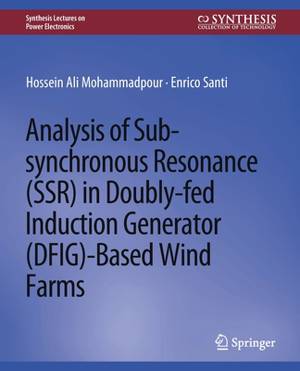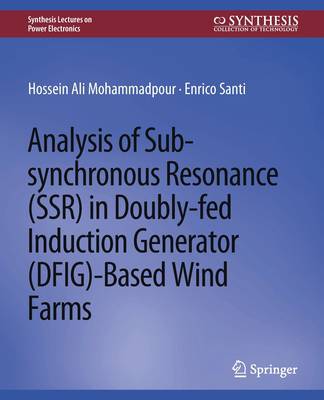
Door een staking bij bpost kan je online bestelling op dit moment iets langer onderweg zijn dan voorzien. Dringend iets nodig? Onze winkels ontvangen jou met open armen!
- Afhalen na 1 uur in een winkel met voorraad
- Gratis thuislevering in België vanaf € 30
- Ruim aanbod met 7 miljoen producten
Door een staking bij bpost kan je online bestelling op dit moment iets langer onderweg zijn dan voorzien. Dringend iets nodig? Onze winkels ontvangen jou met open armen!
- Afhalen na 1 uur in een winkel met voorraad
- Gratis thuislevering in België vanaf € 30
- Ruim aanbod met 7 miljoen producten
Zoeken
Analysis of Sub-Synchronous Resonance (Ssr) in Doubly-Fed Induction Generator (Dfig)-Based Wind Farms
Hossein Ali Mohammadpour, Enrico Santi
€ 21,45
+ 42 punten
Uitvoering
Omschrijving
Wind power penetration is rapidly increasing in today's energy generation industry. In particular, the doubly-fed induction generator (DFIG) has become a very popular option in wind farms, due to its cost advantage compared with fully rated converter-based systems. Wind farms are frequently located in remote areas, far from the bulk of electric power users, and require long transmission lines to connect to the grid. Series capacitive compensation of DFIG-based wind farm is an economical way to increase the power transfer capability of the transmission line connecting the wind farm to the grid. For example, a study performed by ABB reveals that increasing the power transfer capability of an existing transmission line from 1300 MW to 2000 MW using series compensation is 90% less expensive than building a new transmission line. However, a factor hindering the extensive use of series capacitive compensation is the potential risk of subsynchronous resonance (SSR). The SSR is a condition where the wind farm exchanges energy with the electric network, to which it is connected, at one or more natural frequencies of the electric or mechanical part of the combined system, comprising the wind farm and the network, and the frequency of the exchanged energy is below the fundamental frequency of the system. This oscillatory phenomenon may cause severe damage in the wind farm, if not prevented. Therefore, this book studies the SSR phenomenon in a capacitive series compensated wind farm. A DFIG-based wind farm, which is connected to a series compensated transmission line, is considered as a case study. The book consists of two main parts: Small-signal modeling of DFIG for SSR analysis: This part presents a step-by-step tutorial on modal analysis of a DFIG-based series compensated wind farm using Matlab/Simulink. The model of the system includes wind turbine aerodynamics, a 6th order induction generator, a 2nd order two-mass shaft system, a 4th order series compensated transmissionline, a 4th order rotor-side converter (RSC) controller and a 4th order grid-side converter (GSC) controller, and a 1st order DC-link model. The relevant modes are identified using participation factor analysis. Definition of the SSR in DFIG-based wind farms: This part mainly focuses on the identification and definition of the main types of SSR that occur in DFIG wind farms, namely: (1) induction generator effect (SSIGE), (2) torsional interactions (SSTI), and (3) control interactions (SSCI).
Specificaties
Betrokkenen
- Auteur(s):
- Uitgeverij:
Inhoud
- Aantal bladzijden:
- 55
- Taal:
- Engels
- Reeks:
Eigenschappen
- Productcode (EAN):
- 9783031013737
- Verschijningsdatum:
- 1/09/2015
- Uitvoering:
- Paperback
- Formaat:
- Trade paperback (VS)
- Afmetingen:
- 190 mm x 235 mm
- Gewicht:
- 131 g

Alleen bij Standaard Boekhandel
+ 42 punten op je klantenkaart van Standaard Boekhandel
Beoordelingen
We publiceren alleen reviews die voldoen aan de voorwaarden voor reviews. Bekijk onze voorwaarden voor reviews.











